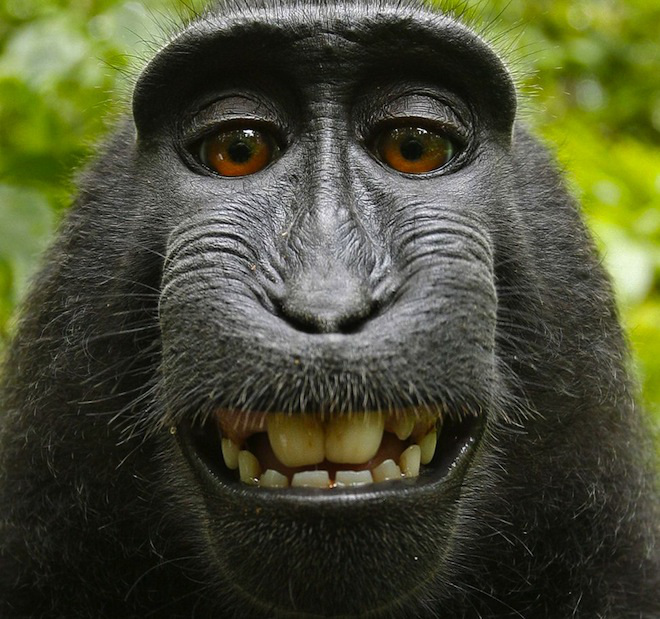U.S. Copyright Office Agrees: Monkey Self-Portraits Are Public Domain
 In news that will disappoint monkey photographers nationwide, a draft report from the U.S. Copyright Office seems to make the regulators’ opinion pretty clear on the question of who holds the copyright for a photo — or any work — created by an animal.
In news that will disappoint monkey photographers nationwide, a draft report from the U.S. Copyright Office seems to make the regulators’ opinion pretty clear on the question of who holds the copyright for a photo — or any work — created by an animal.
This issue recently made headlines because of an ongoing dispute between professional photographer David Slater and the folks at Wikimedia, the organization behind Wikipedia.
A few years back, Slater traveled to Indonesia and attempted to snap some photos of macaque monkeys. One of these monkeys snatched a camera of Slater’s and began taking photos with it. Most were worthless, but the above photo — a self-portrait taken by the monkey — looks like it could have been taken by a professional.
The photo was eventually uploaded to Wikimedia Commons, a library of public domain photos. Slater has repeatedly tried to claim copyright and asked for the photo to be removed, but Wikimedia claims that the monkey is the photographer, and since non-humans can’t hold copyright, the photo is in the public domain.
And that seems to be the standing of the U.S. Copyright Office. In its vast, 1,200-page draft of the Compendium of U.S. Copyright Office Practices, Third Edition [PDF], it states:
“The Office will not register works produced by nature, animals, or plants. Likewise, the Office cannot register a work purportedly created by divine or supernatural beings, although the Office may register a work where the application or the deposit copy(ies) state that the work was inspired by a divine spirit.”
It then gives several examples of things that will not register a copyright for, and right at the top of the list is “A photograph taken by a monkey.”
Other examples:
• A mural painted by an elephant.
• A claim based on driftwood that has been shaped and smoothed by the ocean.
• A claim based on cut marks, defects, and other qualities found in natural stone.
So, at least according to U.S. regulations, it doesn’t matter that the monkey took the photo with his camera. It just matters that the monkey took the photo.
We’re not lawyers, but it seems like Slater might have been able to argue his case better if he’d claimed that he deliberately gave the camera to the monkey, as that implies some sort of artistic intent. But even that would be a tough claim to make, as elsewhere the Compendium has prohibitions against registering claims for things like animal choreography.
The monkey selfie case is more like a roommate writing a poem on your computer without your permission. Just because it’s your computer doesn’t suddenly make it your poem. But because the “author” in this case was a monkey, then his creation is apparently free for everyone to use.
Want more consumer news? Visit our parent organization, Consumer Reports, for the latest on scams, recalls, and other consumer issues.

